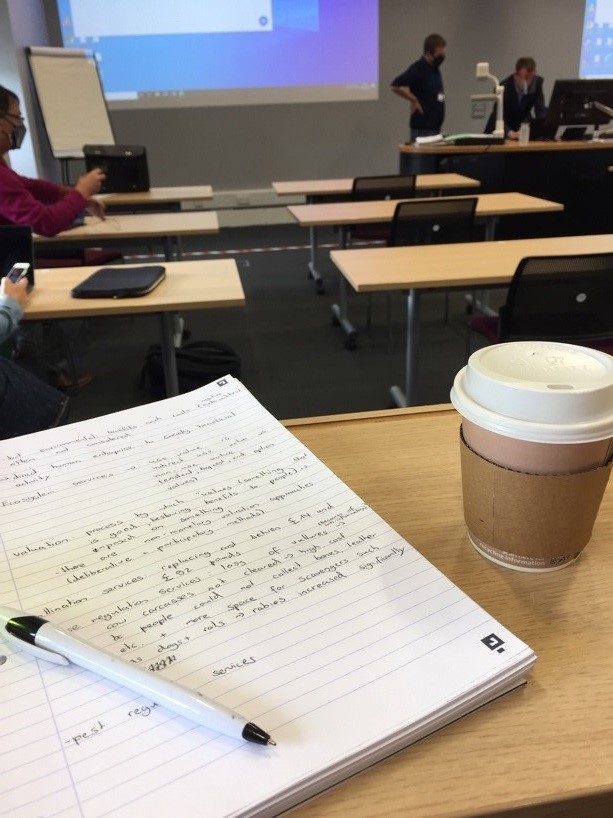It’s half-time!
30/11/2020

Four modules done, four modules to go!
Where did the time go? How is it almost December?
Switching to a new module every two weeks has kept university interesting and engaging throughout the last months, despite some longer Zoom sessions after which your laptop screen is the last thing you want to see for the rest of the day! However, the mix out of face-to-face classes and online sessions here at Cranfield is much better than a full-on online university degree. Plus, there is free coffee in a lot of the buildings. Huge plus!
So far, the modules have focused more on the social sciences and business perspective of sustainability. Because my background is in psychology and environmental sociology, I did have some knowledge coming in but got new insights in every module. Most modules had a group work project with a presentation that was not graded. Furthermore, most modules are taught with other programs, such as “Leading Corporate Sustainability,” which brings people from different backgrounds together. Which also means you get to meet new people every two weeks or so! In the last module, my group analysed the sustainability strategy of Mars Incorporated, suggesting new innovative ideas on how to improve the overall impact of the company. This was also one of the few group projects I have had in my academic career so far that really felt like a group effort.
The graded assignments are individually researched and written, and I enjoyed all of them so far (I am also unusual in that I do enjoy writing papers). I very much enjoyed writing the first assignment, in which I delved deeper into how to reduce your food carbon footprint as a Cranfield student. While there is time in your schedule dedicated to lectures every day, there is much room for individual research and work, as well as time to work out, go grocery shopping, talk to your friends, etc. The workload has been very manageable, but there is always more to read and research.
As the module progresses, things get a little more science-based. The current module is focused on water and agriculture, which includes learning about processes like evapotranspiration. Furthermore, I had to re-evaluate some of my black and white thinking in regards to sustainable food. Just because I am vegan, does not mean that I automatically have the most sustainable diet. While dairy cows in the UK may fart methane into the atmosphere, which majorly contributes to global warming, they consume less water than the avocado I like to eat. However, the water footprint for a dairy cow in the US or New Zealand might look very different. Also- oat drink: yes, almond drink: no. This is definitely a program that makes you rethink what you put on your plate daily.

I am excited to see what is to come over the next couple of months. Soon I will go home for Christmas to hopefully enjoy a little break from the – somewhat grey– Cranfield winter. However, I am excited to continue my MSc journey in 2021 with hopefully even more and more face-to-face experiences.
Categories & Tags:
Leave a comment on this post:
You might also like…
Company codes – CUSIP, SEDOL, ISIN…. What do they mean and how can you use them in our Library resources?
As you use our many finance resources, you will probably notice unique company identifiers which may be codes or symbols. It is worth spending some time getting to know what these are and which resources ...
Supporting careers in defence through specialist education
As a materials engineer by background, I have always been drawn to fields where technical expertise directly shapes real‑world outcomes. Few sectors exemplify this better than defence. Engineering careers in defence sit at the ...
What being a woman in STEM means to me
STEM is both a way of thinking and a practical toolkit. It sharpens reasoning and equips us to turn ideas into solutions with measurable impact. For me, STEM has never been only about acquiring ...
A woman’s experience in environmental science within defence
When I stepped into the gates of the Defence Academy it was the 30th September 2019. I did not know at the time that this would be the beginning of a long journey as ...
Working on your group project? We can help!
When undertaking a group project, typically you'll need to investigate a topic, decide on a methodology for your investigation, gather and collate information and data, share your findings with each other, and then formally report ...
From passion to purpose: My journey at the Pinnacle of Aviation
By: Sultana Yassin Abdi MSc Air Transport Management, Current Student Born and raised in the vibrant landscape of the UAE, with roots stretching back to Somalia, my life has always been ...






